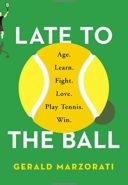
“What have I done with my life?” “What do I have time left to do?” “What am I still capable of?” Perhaps these stirrings and unmet longings live within all of us as we approach new stages of our lives.
Gerald Marzorati explores this idea in his wonderful new memoir, Late to the Ball. After a gratifying career successfully editing the New York Times Magazine, Marzorati sets out in his late 50’s to learn the game of tennis. He begins to train seriously with a coach. The book is not only about the challenges and delight of learning something so difficult as tennis late in life but also, and more importantly, what he learns about himself and from others along the way. He becomes both student and philosopher.
Early on in his attempt to make sense of his unquiet yearnings to explore something new at this point in his life, he consults a psychologist. She tells him:
“I don’t see any reason why someone who is satisfied cannot also be unsatisfied-insomuch as still seeking….The whole point is the search for meaning, and there are lots of different meanings to be found in life.”
This book will certainly resonate with people who still feel like they have something to accomplish (and, hopefully, that’s everybody). I’m reminded of the incredible book, Find a Way, written by the mighty Diana Nyad, who at the age of 64 swam from Cuba to Florida demonstrating out loud to people that you can live out your dreams if you refuse to never give up.
Not all journeys are easy, of course. My favorite part of Late to the Ball is when Marzorati consults a famous sports guru and life coach, Bob Litwin, who advises people on how to overcome the psychological barriers that keep them from reaching their goals and performing their best. As Marzorati discovers first hand, tennis has a huge psychological component that can wreak havoc on one’s psyche and ability to play well under pressure. And so Litwin tells Marzorati, “What I’d really like you to do, Gerry, is really dig deeper into yourself. I want you to begin writing down the elements that make up the old story of you, you and your tennis game….And then I want to work with you to start writing a new story.” It’s a powerful message to think that we are in control of re-writing our own stories.
Late to the Ball is a wonderful, smart read.